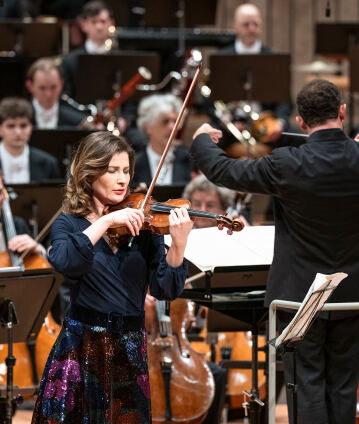Kirill Petrenko and Lisa Batiashvili

Intimate and passionate: Karol Szymanowski’s First Violin Concerto is thought to be a secret declaration of love to the violinist Paul Kochanski. Lisa Batiashvili, Artist in Residence for 2023/24, is able to reveal the poetry of this work. Richard Strauss does not depict his family life secretly but quite openly and humorously in his Symphonia domestica – including a child’s cries, a marital quarrel and reconciliation. Kirill Petrenko conducts.
For his Tragic Overture – which, incidentally, is not programmatic – Johannes Brahms scored trombones and tuba for the dark timbres. This rarely performed work reveals how much Brahms enjoyed experimenting with form, for within the single movement he combines the typical movement elements of an entire symphony: the drive of a first movement, the funeral march character of a second movement, the scherzando of a third, and the repeated drive of a finale.
Karol Szymanowski’s violin concerto, premiered in 1922, is also characterised by a single movement, thematic economy and a free formal progression. The work is influenced by French Impressionism, the music of Béla Bartók and impressions from Szymanowski’s stay in southern Europe and is characterised by a uniquely sensuous and occasionally almost trance-like atmosphere. The solo instrument usually soars in a high register above the sophisticated sound of the orchestra. The composer was advised by the dedicatee Paul Kochanski, who also wrote the solo cadenza. For Lisa Batiashvili, the concerto marks “the turning point between Romanticism and Modernism”.
Kirill Petrenko concludes this programme with Richard Strauss, another major representative of the symphonic poets. His Sinfonia domestica, premiered in New York in 1904, forms the provisional conclusion of his group of tone poems – before the Alpensinfonie, which was only published ten years later. Prior to this, the composer had been inspired by the “superman” from Nietzsche’s Also sprach Zarathustra, among other things. This was followed by a look at his own marriage and family life – not so much “superman” as “all-too normal man”, to use Nietzsche’s terminology. The score is characterised by sumptuous orchestration, delicate lyricism, vivid imagery and humour.
Strauss performed the long unrecognised work several times as a conductor with the Berliner Philharmoniker, including in 1939, when he appeared with the orchestra for the last time in the year of his 75th birthday.
© 2024 Berlin Phil Media GmbH
Related interviews
Artists
Our recommendations
- Paavo Järvi and Lisa Batiashvili with Sibelius’s Violin Concerto
- Benefit concert “Together for humanity”
- 2007 Europakonzert from Berlin with Simon Rattle, Lisa Batiashvili and Truls Mørk
- Iván Fischer and Lisa Batiashvili
- 2024 Europakonzert with Daniel Harding and Lisa Batiashvili from Tsinandali (Georgia)
- Lisa Batiashvili and Simon Rattle at the Easter Festival in Baden-Baden